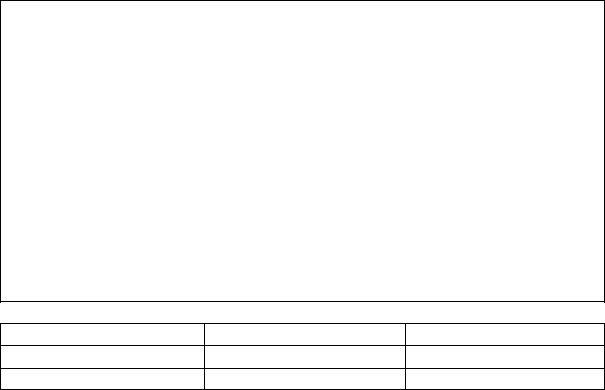
597
.pdfGLOSSARY OF ENGLISH SMS ABBREVIATIONS
Abbreviation |
Meaning |
Значение |
@ |
at |
|
adn |
any day now |
в самое ближайшее время |
afaik |
as far as I know |
насколько мне известно |
atb |
all the best |
|
b |
be |
|
b4 |
before |
|
b4n /bfn |
bye for now |
ну, пока! |
bbl |
be back late(r) |
|
bcnu |
be seeing you |
увидимся!/до встречи! |
brb |
be right back |
обязательно вернусь |
btw |
by the way |
кстати, между прочим |
bwd |
backward |
|
c |
see |
|
cu |
see you |
увидимся!/до встречи! |
cu18r |
see you later |
|
f2f |
face to face |
лицом к лицу |
f2t |
free to talk |
есть время поболтать |
fwd |
forward |
если это имеет значение |
fwiw |
for what it’s worth |
|
fyi |
for your information |
к вашему сведению |
gal |
get a life |
займись делом |
gr8 |
great |
|
h8 |
hate |
|
hand |
have a nice day |
всего доброго/хорошего |
hth |
hope this helps |
|
ic |
I see |
я понял |
iluvu/ilu |
I love you |
|
imho |
in my humble opinion |
по моему скромному мнению |
imo |
in my opinion |
|
iow |
in other words |
другими словами |
jic |
just in case |
на всякий случай |
jk |
just kidding |
шучу |
kit |
keep in touch |
не пропадай! (звони, пиши) |
kwim |
know what I mean |
|
18 |
late |
|
18r |
later |
удачи! |
lol |
lots of luck, |
|
|
laughing out loud, |
заливаюсь смехом |
51
|
lots of love |
много любви (пожелание) |
mob |
mobile |
|
msg |
message |
|
myob |
mind your own business |
а тебе какое дело? |
ne |
any |
|
nel |
anyone |
|
nol |
no one |
|
oic |
oh, I see |
я понял |
otoh |
on the other hand |
с другой стороны |
pcm |
please call me |
|
pls |
please |
|
ppl |
people |
|
r |
are |
|
rofl |
rolling on the floor, |
катаюсь по полу от смеха |
|
laughing |
|
ru |
are you |
|
ruok |
are you OK? |
с тобой все в порядке? |
sit |
stay in touch |
не пропадай |
som1 |
someone |
|
spk |
speak |
|
thkq |
thank you |
|
thx/tx |
thanks |
до встречи!/ поговорим позже |
ttyl |
talk to you later |
|
u |
you |
|
ur |
you are |
|
w/ |
with |
|
wan2 |
want to |
|
wan2tlk |
want to talk? |
|
werv u bin |
where have you been? |
где пропадал? |
wknd |
weekend |
|
wot |
what |
|
wu |
what’s up? |
как дела? |
X |
kiss |
|
xlnt |
excellent |
|
xoxoxo |
hugs and kisses |
крепко целую и обнимаю |
yr |
your/you’re |
|
1 |
one |
|
2 |
to/too |
|
2day |
today |
|
2moro |
tomorrow |
|
52
|
2nite |
|
tonight |
|
|
|
3sum |
|
threesome |
|
|
|
4 |
|
for |
|
|
|
Emoticon |
Meaning |
Значение |
|
|
|
|
|
smiling, happy face |
улыбающаяся, счастливая рожица |
|
|
|
|
frowning, bored |
нахмурил брови, скучно |
|
|
:-e |
|
disappointed |
разочарован, огорчен |
|
|
|
|
unhappy face |
несчастная рожица |
|
|
%-) |
|
confused |
смущен, озадачен |
|
|
:’-( |
|
crying |
плачу |
|
|
;-) |
|
winking happy face |
подмигивающая довольная рожица |
|
|
|-o |
|
tired, asleep |
устал, сплю |
|
|
:-\ |
|
sceptical |
с недоверием, сомнением |
|
|
:-D |
big smile, laughing face |
улыбка во весь рот, смеющаяся р. |
|
|
|
:– |
amazed |
изумлен, поражен |
|
|
|
X= |
fingers crossed |
скрестив пальцы (наудачу) |
|
|
|
:-p |
tongue sticking out |
с высунутым языком |
|
|
|
:-O |
shouting, surprised |
кричу, удивлен |
|
|
|
:-Q |
I don’t understand |
не понимаю |
|
|
|
:-X |
my lips are sealed, |
держу рот на замке, |
|
|
|
|
I won’t tell anyone |
никому не скажу |
|
|
|
O |
angel |
|
|
|
|
:-x |
big kiss |
крепкий поцелуй |
|
|
|
:-o |
“Oooh!”/shocked face |
ух ты!/ой!/шокированная рожица |
|
|
|
@}-,-‘– |
|
a rose |
роза (знак любви) |
|
|
|
|
|
|
|
USING THE TELEX AND FAX
Some countries still use telex for sending international messages. You work in Koon Ming and when you arrived at work today, you found a telex from London and notes from your boss. Use the notes to send a telex in reply.
53

OCC
473285 INTERL RS
936281 LINTON G
12.00
TX3606 21.12.15 ATTN MR CHANG
RYT 20.12.15 PLS INFORM CIF PRICE FROM KOON MING FOR 150XXXX 160 UNITS MODEL CXEEE CY. PLS GIVE EARLIEST DELIVERY DATE
REPLY SOONEST THANKS
REGARDS
BILL EVANS
936281 LINTON G
473285 INTERL RS
Please send this telex straightaway: To Line Tonnage Ltd., -
For the attention of Mr Evans.
The CIF price to London for 160 units would be $11,285. The earliest ETA would be 4 weeks after placing an order.
Does he want the price in sterling or in dollars? Ask him to send us a telex as soon as he can, marked for my attention. Send him my regards too.
Bill Chang
International telex abbreviations
ABS – absent / office closed
ATTN – for the attention of
DER – line or machine faulty
FIN – end of message
NC – lines engaged
OCC – customer engaged
OK – agreed
PLS / SVP – please
RPT – please repeat your message
RYT – reference your telex
TX / TLX – telex
54

WRU – who are you? (please identify)
EEE – an error, the next word
XXX – replaces the last word
In Europe Bill Evans usually uses the fax for international messages. Reorganize and complete this fax to the warehouse.
FROM…………………………Tonnage Limited, London
……………… ……………(0)71 565 9034
FAX………………………….. |
TO Line Warehouse |
NUMBER OF PAGES……… |
ATTENTION…………………. |
……………3 January 2015 |
……………. ……….Bill Evans |
TIME…………….. |
DELIVERY FROM…………… |
Dear Kate |
|
160 units are arriving from Koon Ming in 4 weeks.
I have telexed confirmation of payment and transportation costs. Please prepare space for this consignment.
Best regards
SENDER |
DATE |
FAX NO. |
KOON MING |
10.35 A.M. |
Line |
TRANSMISSION |
Kate Phelps |
1 (one) |
Match the next fax with the appropriate spoken words:
1.PAYMENT OF THIS INVOICE IS OVERDUE.
2.PAYMENT IS NOW DUE.
3.YOU HAVE OVERPAID BY $500.
4.YOU HAVE UNDERPAID BY $1,000. PLEASE ADJUST.
5.THE AGREED TERMS OF PAYMENT HAVE NOT BE ADHERED TO.
6.ACCORDING TO OUR RECORDS THE AMOUNT OF $1,500 IS STILL OUTSTANDING.
a)The total was $4,000 and you have sent us $4,500.
b)You have not kept to the terms of our contract.
c)I’ve checked and you still owe us $1,500.
d)This invoice should have been paid a month ago.
e)The total was $4,000 and you have only sent us 3,000. Can you send us the balance immediately?
f)Can you let us have this amount right away?
55
Тема 4. Этика и языковые особенности телефонных переговоров
This datafile gives you many of the terms and phrases commonly used in making telephone calls.
The phone book
–Look up their number in the phone book (directory).
–I’ll look up the number in the telephone book (US).
–The number is ex-directory (UK).
–The number is unlisted (US).
–I’ll ring Directory Enquires for the number (UK).
–I’ll call information (US).
The line
–He’s on the other line.
–Would you like to hold the line?
–The line is engaged (UK).
–The line is busy (US).
The receiver
–Can I help you?
–Putting you through.
–I’m afraid he’s not available at the moment (UK).
–I’m afraid he’s tied up at the moment (US).
–You ‘re welcome. Goodbye.
The operator
–Dial 100 for the operator (UK).
–Dial 0 (zero) for the operator (US).
If you want the person that you are calling to pay for the call, you ask for a transfer charge call (UK) or a collect call (US):
–I’d like to make a reverse charge (transfer charge) call (UK).
–I’d like to make a collect call (US).
If delays are possible, you may have to book a call:
– I’d like to book a call to Japan.
You may want to make a person-to-person call to someone:
–It’s a person-to-person call to Mr Lee.
–International operator.
–I’d like to make a call to Japan.
–What is the number?
–The number is Tokyo 3-3-5-7 2-1-6-8.
A message pad
–Can I tell him who called?
–Can I give her a message?
–Could I take your number?
56
The dial
–Dial 123 for the correct time (UK).
–Listen for the dialling tone.
–All lines to the country you have dialled are engaged. Please try later (UK).
Remember
If you do not understand, say … “Sorry, I didn’t quite catch that”. “Sorry, could you say that again”.
Phoning home
In English, telephone numbers are given one figure after another, example 0- 1-0-3-1-2-4-7. To make a call from your room, you will probably have to ask the reception (desk) to obtain the number for you.
You could say: Could you call this number for me, please? It’s 0-1-0-3-1-
4-7-2-9-3-0-6.
Now ask for these numbers:
1.010 54 39612
2.010 58 97845
3.Riyadh 21 375362
4.Singapore 3982712
Finding overseas numbers
For prompt help with finding the telephone number or fax number of someone overseas, call International Directory Enquires on 153. For numbers in the Irish Republic, call 192. There are charges for these services – the same price as you pay for UK Directory Enquires – but you can make two enquires at once for the same cost.
A few countries in the world cannot be dialed direct. Dial 155 and the international operator should be able to assist you. For phone or fax numbers abroad, dial 153. To report a line fault, dial 151. For your nearest BT Bureau Fax office, dial 0800 272 172. To send a telegram / Telemessage from London, Birmingham or Glasgow, dial 190, from elsewhere dial 100.
Because international numbers are slightly longer than UK ones, it helps to have the full number in front of you as you dial.
Dial carefully without leaving any pauses between digits.
Allow at least a minute for the connection to be made. (You are not charged until the number answers.)
If you can’t get through, check the following:
–check the country code and the area code of the country you want to call;
–alternatively, you can check with International Directory on 153;
–if the number is always engaged, try again at a different time of day;
–if continually engaged, dial 151 and ask for the line to be tested. International lines are usually very clear, but if you can’t hear properly, hang
up and try again.
57
If the reception says: One moment! or Hold the line! you should wait. Please hang up and I’ll call you back, you should put down the telephone and wait for it to ring.
Example:
Reception: Can I help you? ___________________________________
Certainly. What is the number, please?__________________
I’m sorry? Could you give me that again? _______________
Thank you. Hold the line, please… You’re through now.
Desk: Hello? ________________________________________________
Number please? ________________________________________
Just a moment… I’m sorry, what was the number you wanted?
______________________________________________________
Right. I’ll call you back…
I have your call on the line. Go ahead, please.
1.You want to make a call from your London hotel room to your company in Singapore. The number is Singapore 3982712. Now pick up the phone.
2.You want to make a call from your hotel room in Venezuela to your home in Saudi Arabia. The number is Riyadh 21 375362. Now pick up the phone.
Direct dialing
With direct dialing, you go straight through to the number of the person you want in the UK, and you pay in the country you’re in. All you need to know is the telephone number in the UK, which is made up of the phone number itself, and its area code, e.g. 0272 (area code for Bristol).
When dialing from abroad you must always omit the initial ‘0’ of the area code.
The only other information you need is the international code for the UK which you must dial first. This will vary from country to country.
Remember, for direct dialing you will need to know:
–international code for the UK,
–UK area code (leaving out initial ‘0’,
–local number.
For instance, to call Bristol (0272) 12345 for Austria you just dial 0044 272 12345 and you’re through.
Note that several countries, like the UK, have cheaper international calls at certain times for direct dialing.
1. After studying the Datafile, decide whether the following are true or false.
1.For international calls you dial: the country code + the area code + the number.
2.The caller does not pay for a collect call.
3.Directory Enquires will put you through to the number you want.
58

4.Switchboard and operator are the same people.
5.The dialing tones for “ringing” and engaged” are different.
2. Insert the missing word.
1. Look it ____ in the directory.
2. He’s ____ the other line.
3. Listen ____ the dialing tone.
4. He’s tied _____.
5. She’ll ring _______.
3. Insert the correct term. |
|
|
UK term |
US term |
|
1) |
Directory Enquires |
__________ |
2) reverse charge call |
__________ |
|
3) |
______________ |
busy |
4) |
______________ |
area code |
5) ex-directory |
___________ |
|
4.Look at the telephone conversations. Make up your own conversations.
1– Conglomerate group. Can I help you?
–Good morning. Sorry, I must have the wrong number.
2– Conglomerate group. Can I help you?
–Could I speak to John Pardee, please?
–Hold the line. Putting you through.
–Sales Department. John Roberts speaking.
–Sorry, I must have the wrong extension. Could you transfer me back to Switchboard, please?
3– Conglomerate group. Can I help you?
–Could I speak to John Pardee, please?
–Hold the line. Putting you through.
–Mr Pardee’s office. Can I help you?
–Could I speak to Mr Pardee please?
–I’m afraid Mr Pardee is …
4– Conglomerate group. Can I help you?
–Could I speak to John Pardee, please?
–Hold the line. Putting you through.
–Mr Pardee’s office. Can I help you?
–Could I speak to Mr Pardee please?
–I’m afraid Mr Pardee is on the other line at the moment. Would you like to hold?
–Yes, I’ll hold.
–Putting you through, now.
5– Conglomerate group. Can I help you?
59

–Could I speak to John Pardee, please?
–Hold the line. Putting you through.
–Mr Pardee’s office. Can I help you?
–Could I speak to Mr Pardee please?
–I’m afraid Mr Pardee is not in the office at the moment.
–When will he be back?
–Not until tomorrow, I’m afraid.
–I’ll ring him then. Thank you. Goodbye. 6 – Conglomerate group. Can I help you?
–Could I speak to John Pardee, please?
–Hold the line. Putting you through.
–Mr Pardee’s office. Can I help you?
–Could I speak to Mr Pardee please?
–I’m afraid Mr Pardee is in a meeting. Can I give him a message?
–Yes please. Could you ask him to call me back. My name is Helmut Cohen from Leclerc Systems. My number is 2789441.
7– Conglomerate group. Can I help you?
–Could I speak to John Pardee, please?
–Hold the line. Putting you through.
–Mr Pardee’s office. Can I help you?
–Could I speak to Mr Pardee please?
–I’m afraid Mr Pardee is away on vacation.
–Perhaps I could speak to someone else in the Purchasing Department?
–I’ll put you through Mr O’Conner.
8– Conglomerate group. Can I help you?
–Could I speak to John Pardee, please?
–Hold the line. Putting you through.
–Mr Pardee’s office. Can I help you?
–Could I speak to Mr Pardee please?
–Can I tell him who’s calling?
–Helmut Cohen from Leclerc Systems.
–Putting you through.
–Good morning, Mr Pardee. This is Helmut Cohen from Leclerc Systems.
–Good morning.
–Is the voice clear? If not say…
–Sorry, it’s a bad line. Could you speak up, please?
60
